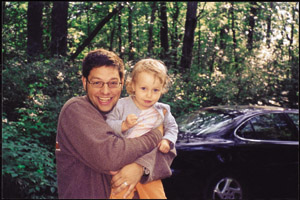Did
you answer "mama"? Then you must be up on your Italian
news-and you may be on your way to winning "the most exciting
prize in public radio": the voice of Carl Kasell, newscaster
for National Public Radio's Morning Edition, on your
answering machine. But to win this coveted prize, you also must
be a contestant on NPR's Wait Wait… Don't Tell Me!
|
|
Goedicke, with daughter Madeleine, of who he writes:
In your stroller you helped me sate fate.
Steady anapests paced our gait's rate.
For clickety-clacks
On Hyde Park's sidewalk cracks
Helped me pace my first rhymes for Wait Wait.
|
An
hour-long comedy quiz show, Wait Wait tests contestants'
knowledge of the week's news. Its host, Peter Sagal, along with
"sidekick, scorekeeper, all-around genius/ funny guy"
Carl Kasell, and three panelists from the news and entertainment
world, present an irreverent look at current events-poking fun
at the more serious stories and showcasing the wacky and absurd.
Listeners from around the country call to play Wait Wait's
games.
Among
the most popular is the Listener Limerick Challenge. To win,
contestants listen to Carl Kasell read limericks based on the
week's news stories, and they complete the verses with the correct
words. Since July 2000 the job of writing these limericks each
week has fallen to Goedicke, who studies in the U of C's music
department.
Goedicke
learned of the opportunity to write for Wait Wait while
listening to the show one Saturday morning on Chicago's public
radio station, WBEZ-FM. "Their previous limerick writer
had left her position with NPR," he recalls, "and
they announced on the air that they would accept entries from
listeners. That evening I started messing around with limericks
for the first time in my life, and the following week I submitted
three a day." His command of the verse form so impressed
the show's staff that they used some of his limericks that week,
offering him the "limericist" position soon after.
Limerick
writing for Wait Wait is a fast-paced job. Every Wednesday
Goedicke consults with the production team as to which news
stories will form the limericks' subject matter. That evening
he lists words that rhyme with each story's key word and begins
to think through how each limerick will sound. "I get very
zoned-out. Sometimes my wife, Julie, recognizes a look I get
in my eyes when thinking about these things and asks, 'Are you
limericking again?'" On Thursday morning he sits down to
write and submits the final product by 3:00 p.m.
Goedicke's
initial muse was his dissertation, which focuses on early 20th-century
German cabaret music. "Most of the musical texts I study
are comic and written in verse-form. In reading through this
material, I began to think, 'Hey! I can do that.'" He derives
inspiration from modern satirical literature. "I've been
reading a lot of comedic books and plays by authors like Roy
Blount Jr., Neil Simon, and David Sedaris-stuff I have always
loved but used to feel guilty about reading. Now I approach
this literature from an educational perspective. Instead of
reading simply for enjoyment, I try to get behind the comedy,
to figure out what makes a particular word or passage funny."
His
Wait Wait position has led to other opportunities to
write for NPR shows. He's contributed to On the Media,
Prairie Home Companion, and The Writer's Almanac
(writing birthday bios), and he hopes to continue writing for
these and other programs well into the future. "I have
the best job," he says. "I couldn't dream up a better
way to make money."
-Hilary
Poriss, AM'93, PhD'00

![]()
 There
once was a grad student named Phil
There
once was a grad student named Phil